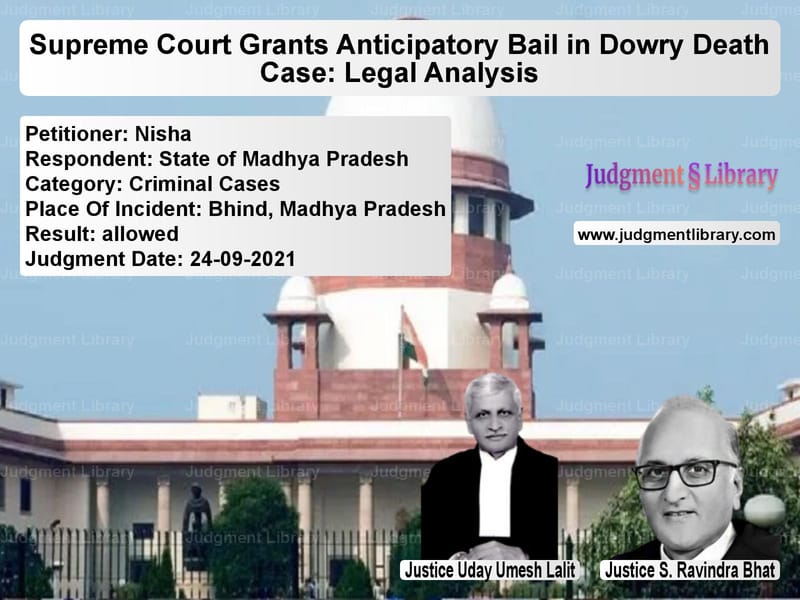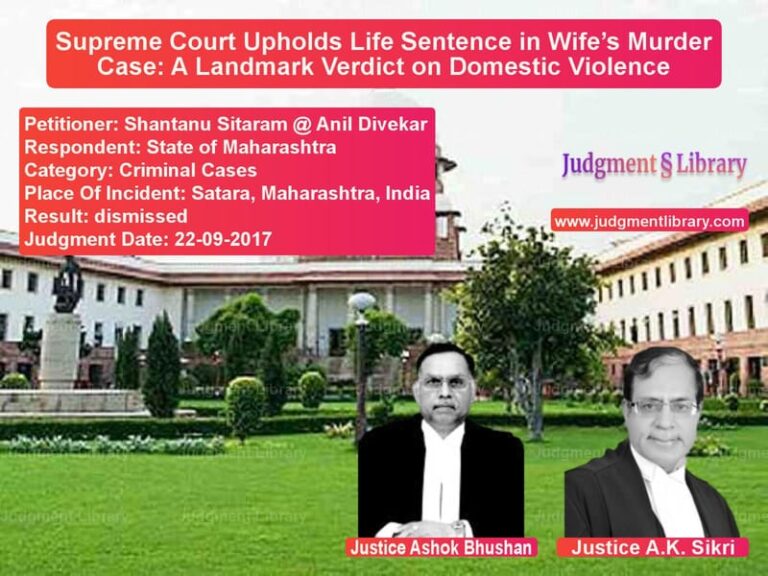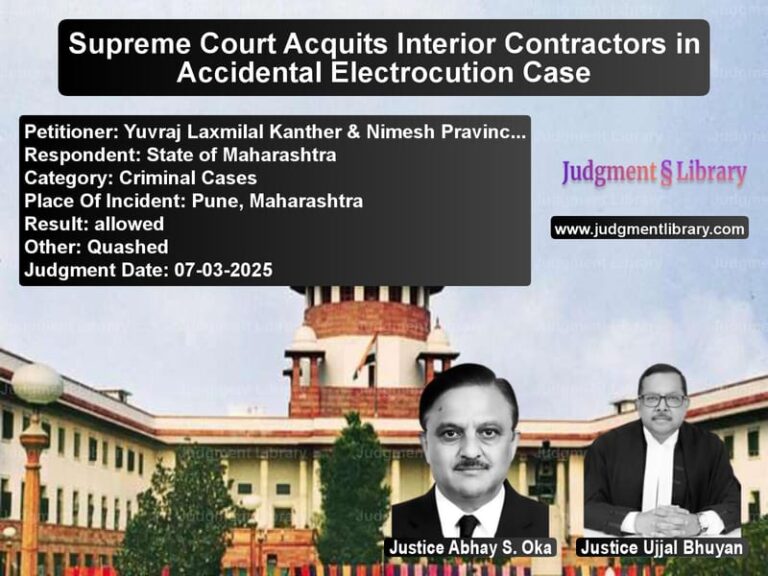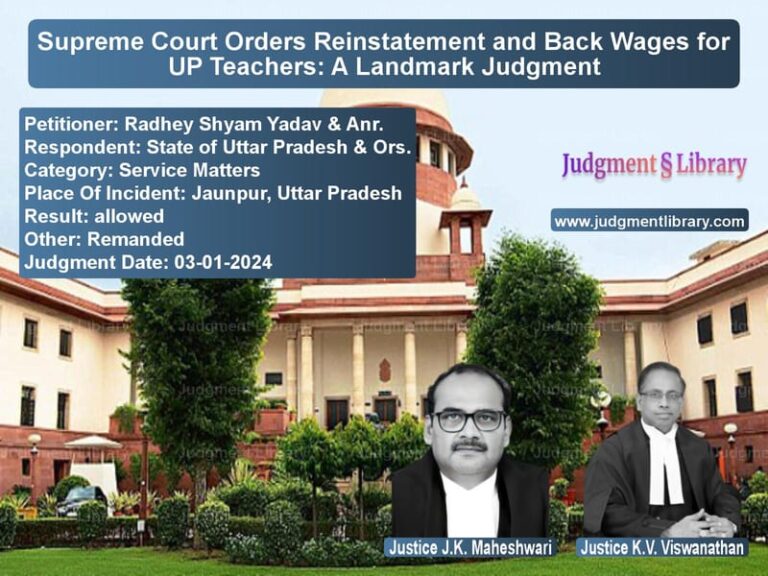Supreme Court Grants Anticipatory Bail in Dowry Death Case: Legal Analysis
The present case involves an appeal by Nisha, the appellant, against the rejection of her anticipatory bail application by the High Court of Madhya Pradesh at Gwalior. The case concerns allegations under Sections 304-B (dowry death), 498A (cruelty by husband or relatives), and 34 (common intention) of the Indian Penal Code (IPC), along with Sections 3 and 4 of the Dowry Prohibition Act, 1961.
The Supreme Court was called upon to determine whether the appellant was entitled to anticipatory bail in light of the serious nature of the allegations and the progress of the investigation.
Background of the Case
The case originates from an FIR (No.104 of 2021) dated March 23, 2021, lodged at Police Station Mehgaon, District Bhind, Madhya Pradesh. The complaint alleged that the appellant, along with other family members, was responsible for the dowry-related death of a woman.
The appellant moved an application for anticipatory bail before the High Court of Madhya Pradesh, which was rejected on May 7, 2021. She then approached the Supreme Court, seeking protection from arrest.
Legal Issues Considered
- Whether the appellant was prima facie involved in the alleged dowry death.
- Whether she was entitled to anticipatory bail under Section 438 of the Code of Criminal Procedure (CrPC).
- The impact of the ongoing investigation and the filing of the charge sheet.
- Whether her release on bail would hinder the investigation.
Arguments by the Appellant
- The appellant argued that she had been falsely implicated in the case.
- She contended that she had no direct involvement in the dowry harassment or the circumstances leading to the victim’s death.
- The prosecution failed to establish a prima facie case against her.
- She was willing to cooperate with the investigation and comply with any conditions imposed by the Court.
Arguments by the State
- The prosecution opposed the bail application, arguing that the allegations against the appellant were serious.
- It was submitted that granting anticipatory bail would hinder the investigation.
- The prosecution also referred to a second complaint, which alleged that the accused’s family was pressuring the complainant.
Supreme Court’s Observations
The Supreme Court, comprising Justices Uday Umesh Lalit and S. Ravindra Bhat, examined the circumstances and made the following key observations:
- The investigation was substantially complete, and the charge sheet had already been filed against some of the accused on June 26, 2021.
- The charge sheet had not yet been filed against the appellant due to the interim relief granted by the Supreme Court on June 22, 2021, which restrained coercive action against her.
- The Court took note of the allegations regarding pressure exerted by the accused’s family but found no compelling reasons to deny anticipatory bail.
- It was emphasized that the appellant must cooperate with the investigation and comply with conditions imposed by the Court.
Final Judgment
The Supreme Court allowed the appeal and granted anticipatory bail to the appellant, setting aside the High Court’s order. The following conditions were imposed:
- The appellant shall be released on bail upon furnishing a cash security of Rs. 25,000 with two sureties of the same amount.
- She must fully cooperate with the investigation.
- She shall not misuse the bail in any manner.
- Any violation of these conditions would result in the cancellation of bail.
Conclusion
The ruling reinforces the principle that bail should not be denied merely due to the gravity of the charges unless there are compelling reasons to believe that the accused’s release would obstruct justice. The judgment upholds the right to liberty while ensuring that the investigation is not hampered.
This decision serves as a precedent in dowry death cases, balancing the rights of the accused with the need for a fair investigation. It underscores that anticipatory bail can be granted even in serious offenses if the Court is satisfied that the accused will not misuse the liberty granted.
Petitioner Name: Nisha.Respondent Name: State of Madhya Pradesh.Judgment By: Justice Uday Umesh Lalit, Justice S. Ravindra Bhat.Place Of Incident: Bhind, Madhya Pradesh.Judgment Date: 24-09-2021.
Don’t miss out on the full details! Download the complete judgment in PDF format below and gain valuable insights instantly!
Download Judgment: nisha-vs-state-of-madhya-prad-supreme-court-of-india-judgment-dated-24-09-2021.pdf
Directly Download Judgment: Directly download this Judgment
See all petitions in Bail and Anticipatory Bail
See all petitions in Dowry Cases
See all petitions in Judgment by Uday Umesh Lalit
See all petitions in Judgment by S Ravindra Bhat
See all petitions in allowed
See all petitions in supreme court of India judgments September 2021
See all petitions in 2021 judgments
See all posts in Criminal Cases Category
See all allowed petitions in Criminal Cases Category
See all Dismissed petitions in Criminal Cases Category
See all partially allowed petitions in Criminal Cases Category







